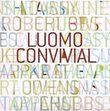| All Artists: Luomo Title: Vocalcity Members Wishing: 0 Total Copies: 0 Label: Huume Germany Release Date: 9/13/2005 Genres: Dance & Electronic, Pop Styles: Electronica, House, Techno, Dance Pop Number of Discs: 1 SwapaCD Credits: 1 UPC: 881390205424 |
Search - Luomo :: Vocalcity
 | Luomo Vocalcity Genres: Dance & Electronic, Pop
|
Larger Image |
CD DetailsSimilar CDs
|
CD Reviews3.5 Stars - A strong release, but not Luomo's absolute best Steward Willons | Illinois | 04/27/2008 (4 out of 5 stars) "Luomo (aka Vladislav Delay [aka Sasu Ripatti]) provides an interesting and unique album with Vocalcity. Under the Luomo alias, Ripatti explores an unusual mixture of dub techno and house. Where his most popular, and arguably most successful album, "The Present Lover", is more house than dub, "Vocalcity" is the opposite. When I say "house", I'm not talking about any house music that is already familiar. The tempo, beat, and vocal style all point to the house style, but the execution draws heavily from Vladislav Delay-style experimentation. It's this twist that I believe makes the music so compelling. You've got the requisite four-on-the-floor bass drum, mildly suggestive vocals, and such, while the dub techno undertones tend to encourage the unusually long track lengths. I've always been more impressed with the instrumental parts than the vocals on Luomo CDs and that is still the case here. The lyrics tend to be simple to the point of being inconsequential - almost not worth listening to for anything beyond the sound of the voice. The vocalists do a fine job, but it's not the album's strength. Granted, house vocals aren't usually known for deep, introspective lyrics, but some are better than others. This isn't a real criticism. Mostly, I'm trying to point out that it's the instrumental parts that really shine and the lengthy track durations seem to support them, giving them room to breathe and develop gradually. I'm rating this at 3.5 stars because while it's good, it's not yet up to the level of "The Present Lover." You can see "Vocalcity" as a logical progression from Vladislav Delay's material to what he eventually arrived at with 'Present', and in that way it's very interesting. However, I wouldn't start here. I'd get "The Present Lover", see if you like it, and if so, give this a try second. It's a strong release, but not Luomo's ultimate statement." Best debut of the decade, largely perfect. Angry Mofo | 02/13/2009 (4 out of 5 stars) "The sound of Vocalcity resembles early Detroit techno and Chicago house: overtly mechanical beats, "machine-like" bass chords, and soft synth drones. But the compositional style is more along the lines of the early- to mid-nineties, when album artists like Underworld and Orbital tried to make more cerebral music with lots of long, mostly instrumental suite-like pieces running ten minutes and longer. At the same time, Vocalcity is clearly an album of the 2000s, a very minimalist decade. The suites by Underworld and Orbital had obvious divisions into multiple sections, with dramatic movements and crescendo. But Vocalcity is very homogeneous, it uses mostly the same sounds in mostly the same way in every track, and maintains the same hushed tone throughout nearly the whole CD.
Yet, even within these rigid limits, there is some forward motion. It is very slow; adherents of the album's "micro-house" style will claim that the rhythm tracks are very detailed and evolve constantly, but you probably won't notice that. Nonetheless, the end of each track usually does not sound like the beginning, there are gradual, subtle shifts in atmosphere. And occasionally, there are brilliant pop moments. The best is in "Class." After a few minutes of cooing vocals and house beats, gradually building up into an uncertain groove, there is a completely unexpected break, after which a synth-guitar appears out of nowhere with a rousing rhythmic passage, one of the best in all of electronic music. A similar moment occurs towards the end of "The Right Wing," when the same instrument disturbs the delicate tension of the track and leads to a more forceful conclusion. But even these unexpected about-faces are still of a piece with the rest of the album. The music has rich, beautiful dub undertones that give depth to the house rhythms. "The Right Wing" is the most subtle track in this regard; for the first ten minutes or so, the main beat is backed by a thin echo, so thin that one sometimes isn't sure whether it's there, but it's just audible enough to create the mood. The mood, again, is very consistent throughout the album -- distant, minor-key echoes, cool but also a little sad, creating a feeling of lost, drifting loneliness. The synth-guitar rhythm in the second half of "Class" has a harsh, sensual grind, but it's also muted by the production, not much louder than the dub echoes. "She-Center" has a very strong, satisfying drum track (the most powerful on the album), but it's also softened by layers of echo and vocal samples. Vocalcity is not an album to listen to every day, but the mood is incredibly alluring. It recalls the lonely, dramatic sound of early Underworld (one of the most original sounds in all of music), but adapts it for the minimalist style of the 2000s. It is also probably the best debut album of this decade, and quickly made its creator Sasu Ripatti well-known in techno circles. Vocalcity's use of dub to create delicate, sensuous melancholy went unmatched for the whole decade. Despite the title, the vocals are actually the weakest aspect of the music. All the words are sung in the style of generic club tracks, all breathy sighs and airy coos that sound just like any other dancefloor fodder. Wisely, the singing is kept to a minimum throughout most of the album. "Market," "Class" and "Synkro" have no real lyrics, just occasional fragments of sentences. This actually lends itself well to the facelessness of the voices. The plaintive lament, "there's nothing in the world that you can do" surfaces a few minutes into "Market," is repeated a few times, and then subsides. The anonymous loneliness of the words fits perfectly into the atmosphere of the album. "The Right Wing" and "She-Center" don't have any words at all, and they're both excellent. But unfortunately, there is one song with a complete set of lyrics. That song is "Tessio," inexplicably the most popular song off the album, and in my opinion, by far the worst. In "Tessio," Ripatti attempted to create a Radio-Friendly R&B Song, with verses and choruses, out of Vocalcity's isolated, lonely sound. The focus is placed entirely on the vocals; as if on purpose, the song features the least detailed music on Vocalcity. Ripatti's writing is unbelievably, grotesquely bad. The song chronicles the romantic troubles of a sensitive, sophisticated club-goer; apparently, he is troubled by an excessive quantity of women who throw themselves at him. Surely this predicament reveals a great deal about the human condition. But our hero overcomes this tragic flaw in his character, and meditates, with narcissistic dramatism, "Maybe I'll survive, without all these women in my life." You can argue that it's meant to be ironic, but I think that makes it even worse. The idiotic frivolity of Ripatti's lyric really kills the somber mood of the album. I usually skip over "Tessio" (and I rarely skip over songs) right after the fade-out in "The Right Wing." But unfortunately, this was what he actually wanted. His later work is all derived from "Tessio." The second Luomo album, 2004's The Present Lover, even contains a remake of "Tessio" that is even worse than the original, and most of the other songs use a similar template. Oddly enough, a couple of songs on Luomo's most recent album (Convivial, 2008) are able to effectively recreate the melancholy tone of Vocalcity, but the rest of the album repeats Paper Tigers (2006), about which the less said the better. Obviously, Ripatti is not interested in exploring this mood anymore. Which means that Vocalcity stands alone, a lucky accident in music. I would recommend it to anyone, but you may need to program your playlist to avoid "Tessio."" |

 Track Listings (6) - Disc #1
Track Listings (6) - Disc #1
